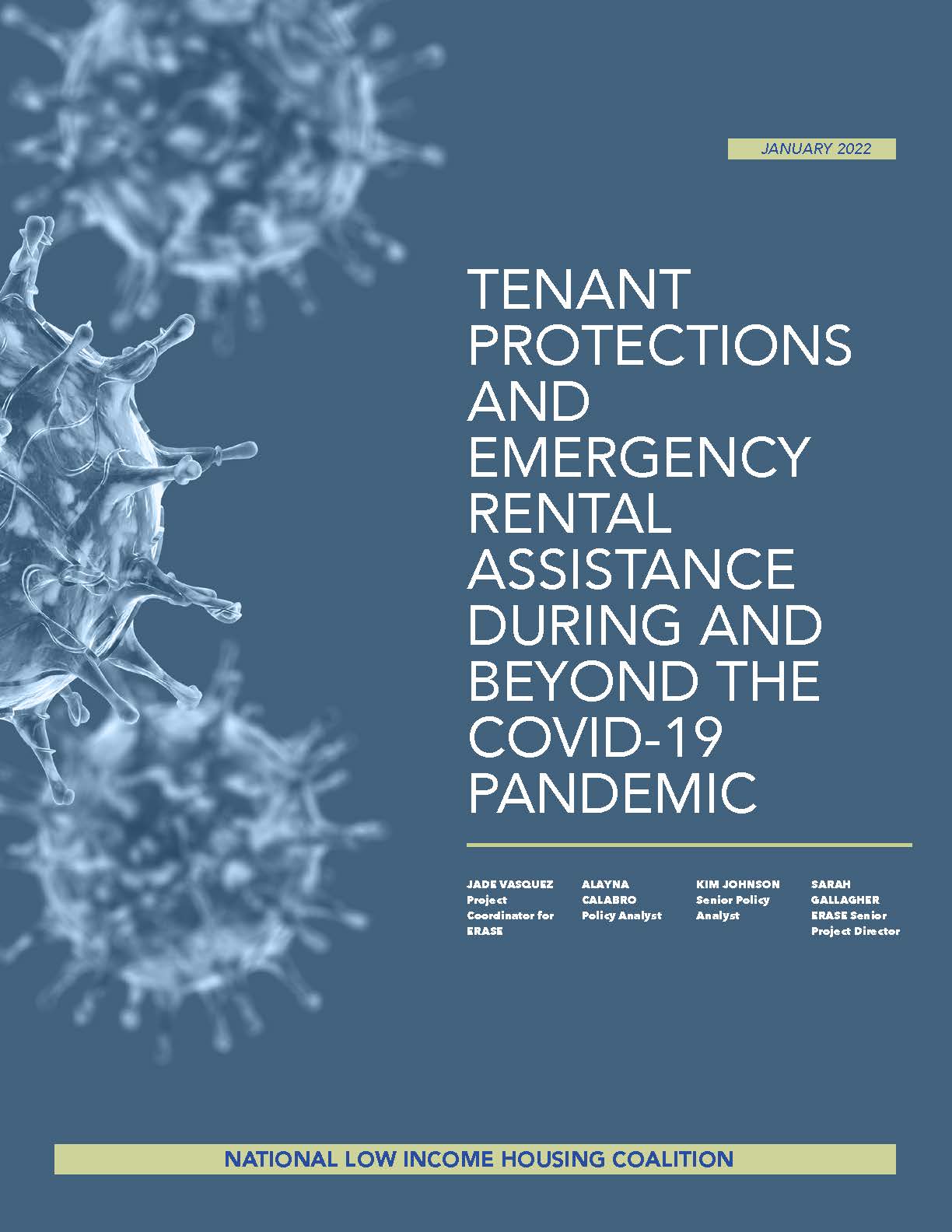-
State and Local Innovation
NLIHC’s State and Local Innovation Project supports state and local partners in advancing, implementing, and enforcing state and local tenant protections, creating and sustaining emergency rental assistance programs, preventing the criminalization of homelessness, and supporting the advancement of housing innovations that seek to keep eviction rates down and prevent homelessness. Our goal is to empower a movement that will strengthen tenants’ rights, prevent evictions, and promote housing stability for renter households with the lowest incomes.
NLIHC’s State and Local Innovation Project’s efforts also help to shape and inform federal policies that meet the needs of the lowest-income and most marginalized renters around the country.
Meet the Team:
Andrew Aurand, Senior Vice President, Research, aaurand@nlihc.org
Victoria Bourret, Manager, State and Local Innovation Outreach, [email protected]
Nada Hussein, Research Analyst, State and Local Innovation, [email protected] -
Strengthen Tenants' Rights
Tenant protections, passed in the form of laws and policies, are critical to preventing evictions and keeping renters stably housed. They can ensure tenants can access safe and affordable housing with fewer barriers to entry and that tenants can maintain their housing over the long term, free from unjust discrimination and harassment. During the pandemic, state and local jurisdictions were quick to recognize the crucial role tenant protections play in preventing evictions and ensuring housing stability for the most marginalized households. Since early 2021, state and local governments have enacted or implemented more than 280 renter protections to protect renters in their jurisdictions.
With a lack of federal tenant protections in place, state and local level protections are crucial to ensure that all renters benefit from basic safeguards to address the power imbalance between landlords and renters. Such protections should include source-of-income laws to prevent landlords from discriminating against voucher holders; “just cause” eviction standards; guaranteed access to legal counsel to put renters on more equal footing with landlords; eviction record sealing and expungement requirements; and anti-rent gouging measures.State and Local Tenant Protections Database
NLIHC’s State and Local Tenant Protections Database tracks state and local tenant protections passed since the onset of COVID-19 as well as specific tenant protections that were in place prior to 2021, such as right to counsel, source-of-income anti-discrimination protections, eviction record sealing and expungement legislation, anti-rent gouging measures, and “just cause” eviction laws. The database also identifies states that have preemption legislation in place. Visit the State and Local Tenant Protections Database.
State and Local Tenant Protections Network
The State and Local Tenant Protections Network, (“The Network”), is a group of state and local housing-justice focused advocacy organizations centered on introducing, advancing, implementing, and enforcing tenant protections.Join the Network today!
Resources Description 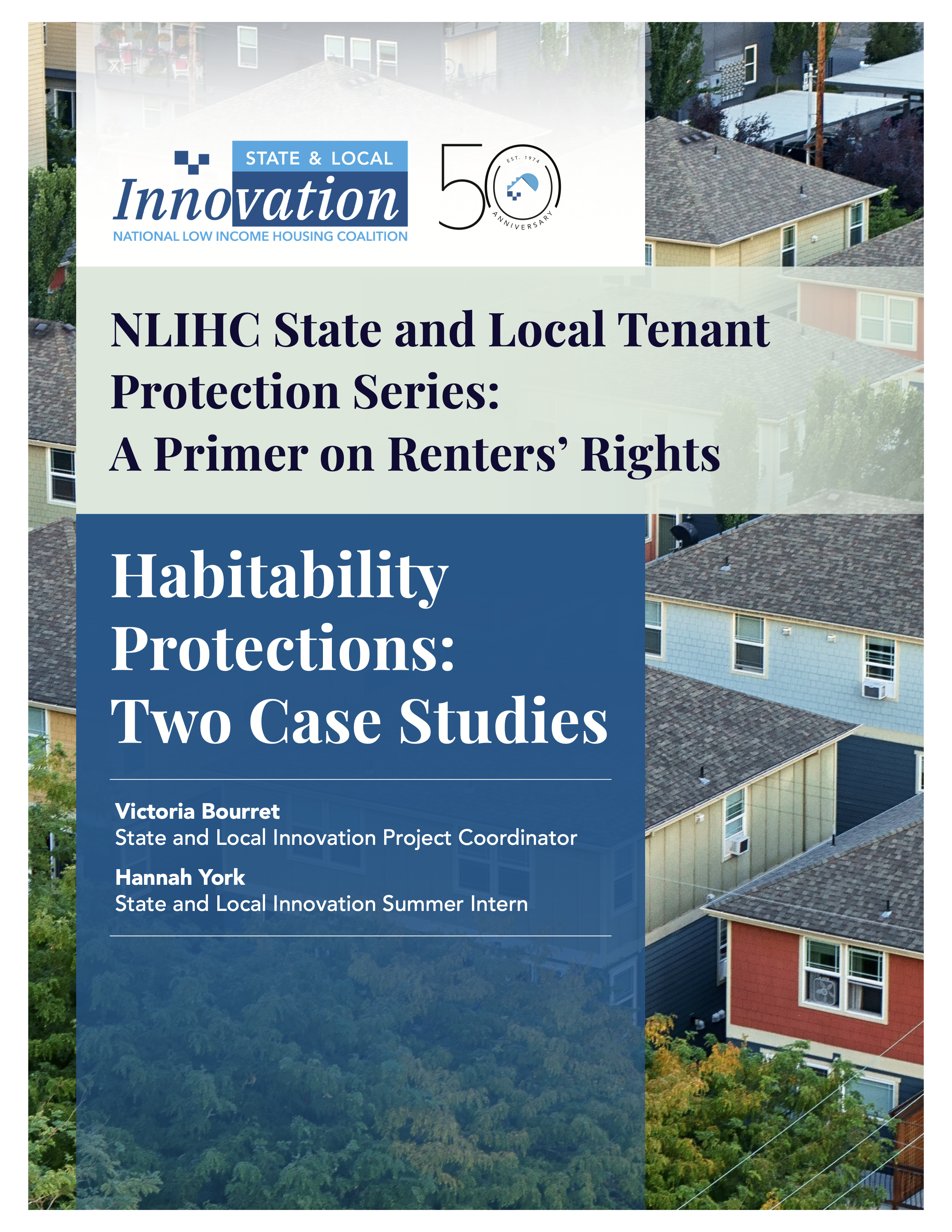
Nationwide, over 6 million families live in housing with serious health and safety hazards, including holes in walls and windows, broken heating and plumbing, pest infestations, falling plaster, mold, missing smoke detectors, crumbling foundations, leaking roofs, and more. Currently, a patchwork of federal, state, and local laws and regulations establish a minimum set of quality standards for rental housing. This publication explores habitability protection measures passed recently in two jurisdictions: New Orleans, Louisiana and Cincinnati, Ohio. 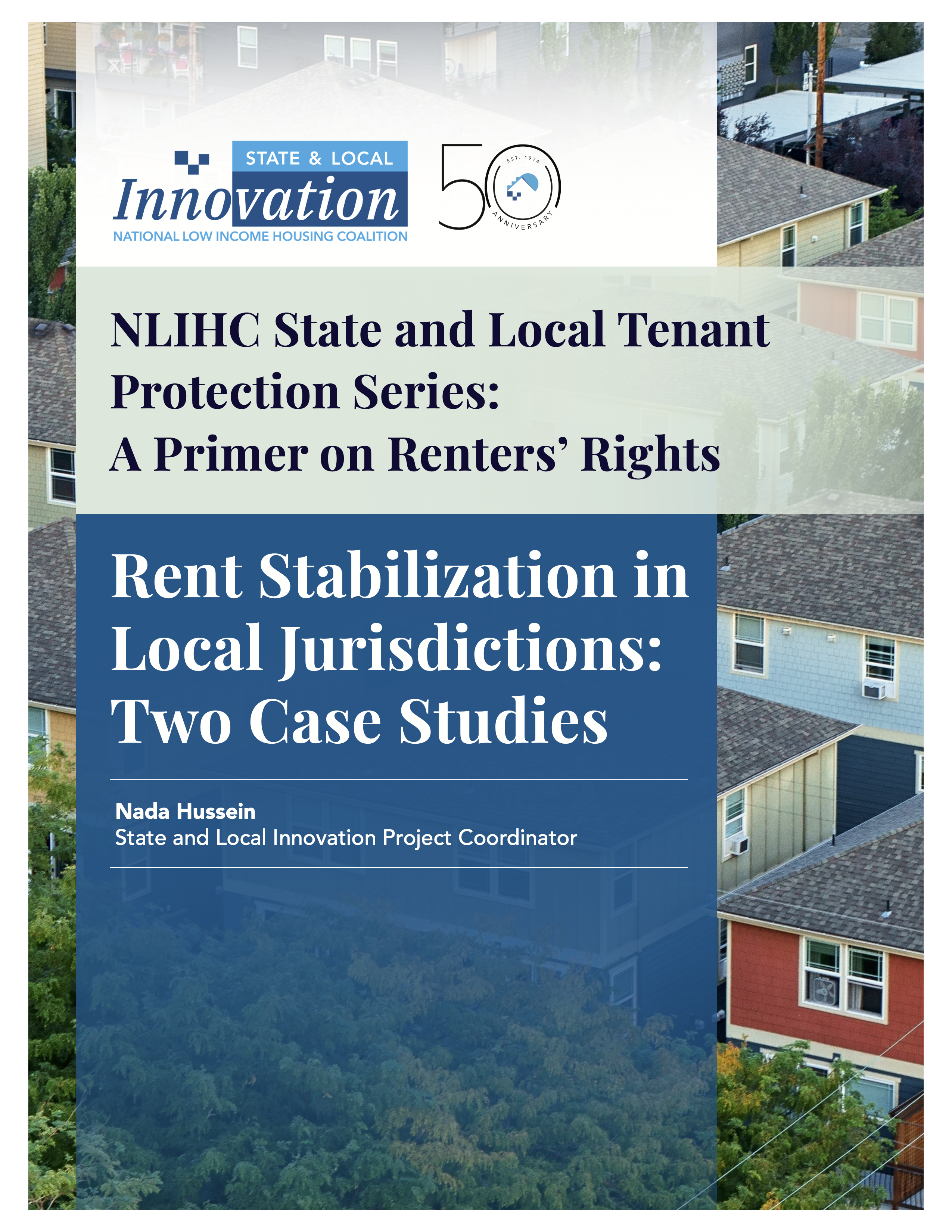
To support renters amid rapidly rising rents, lawmakers in some states and local jurisdictions have sought to pass “rent stabilization” laws. Known also as “anti-rent gouging” laws, rent stabilization laws place limits on the amount that a landlord or property owner can raise rents within a certain time frame. The intent of rent stabilization laws is to ensure that tenants are not displaced from their homes due to increasing rental costs. This publication explores rent stabilization laws passed recently in two jurisdictions: Prince George’s County, Maryland and Portland, Oregon. 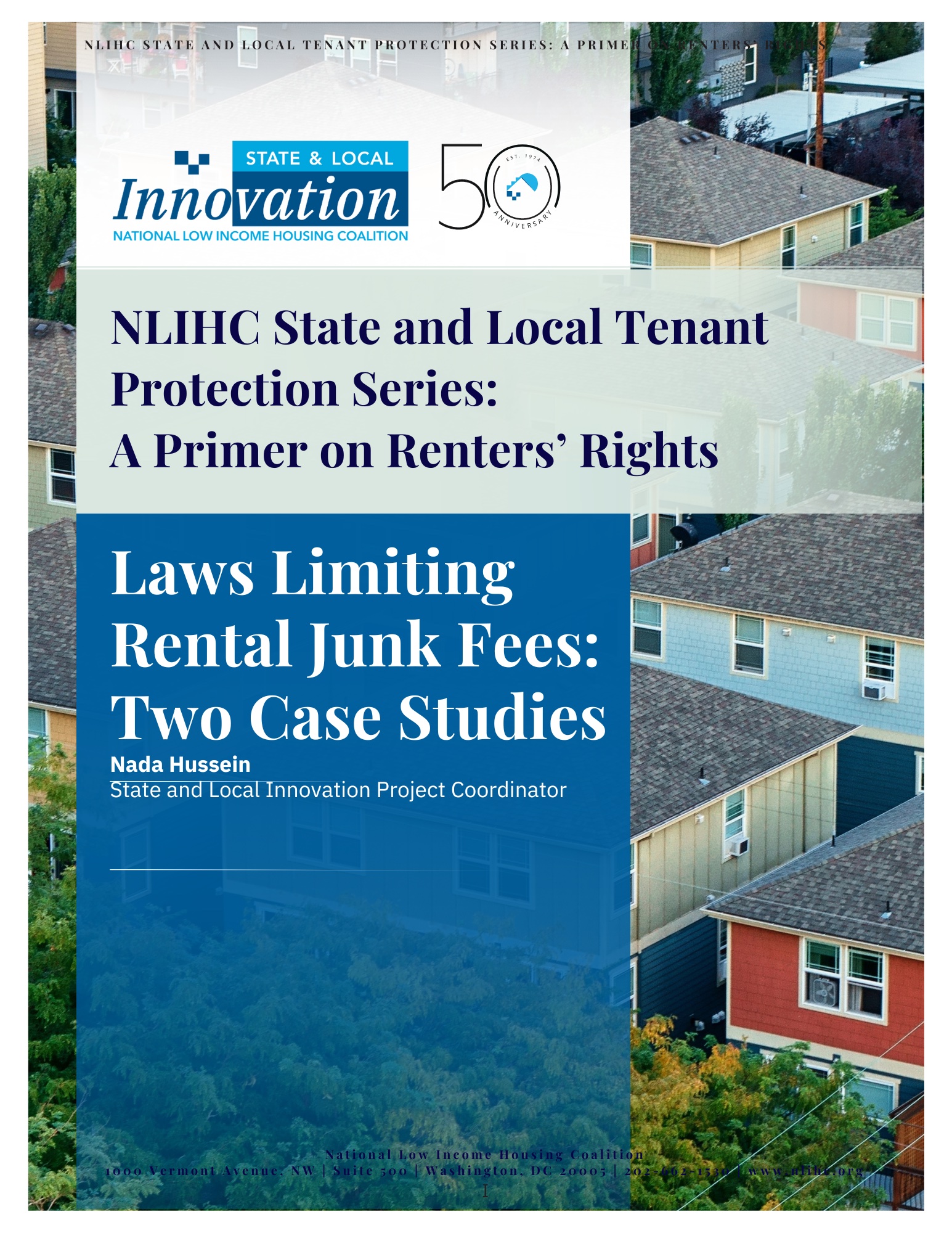
Rental "junk" fees - which can include rental application fees, application processing fees, pet fees, convenience fees, administrative fees, late rent fees, and other fees that raise total rental costs - increase cost burdens for low-income renters, exacerbating housing instability. Released in October 2024 as part of NLIHC’s State and Local Tenant Protection Series: A Primer on Renters’ Rights, this publication presents two case studies focused on laws limiting rental junk fees in Connecticut and Rhode Island. 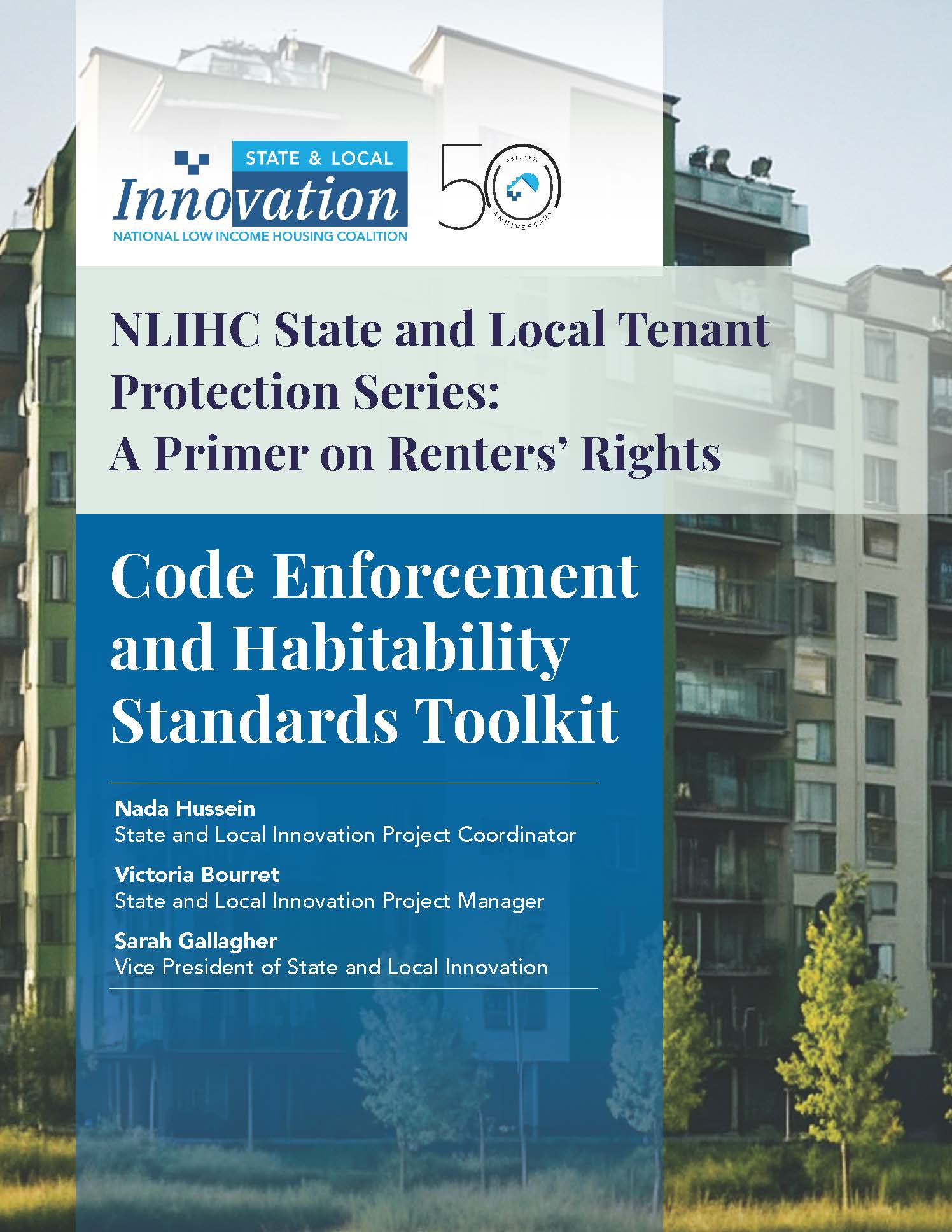
Code enforcement procedures and habitability standards aim to ensure the safety and quality of rental housing units. Part of NLIHC’s State and Local Tenant Protection Series: A Primer on Renters’ Rights, this Code Enforcement Procedures and Habitability Standards Toolkit, released in August 2024, provides an overview of code enforcement procedures and habitability standards, details common components of such protections, lists information about state and local jurisdictions that have adopted these protections, and highlights complementary policies. 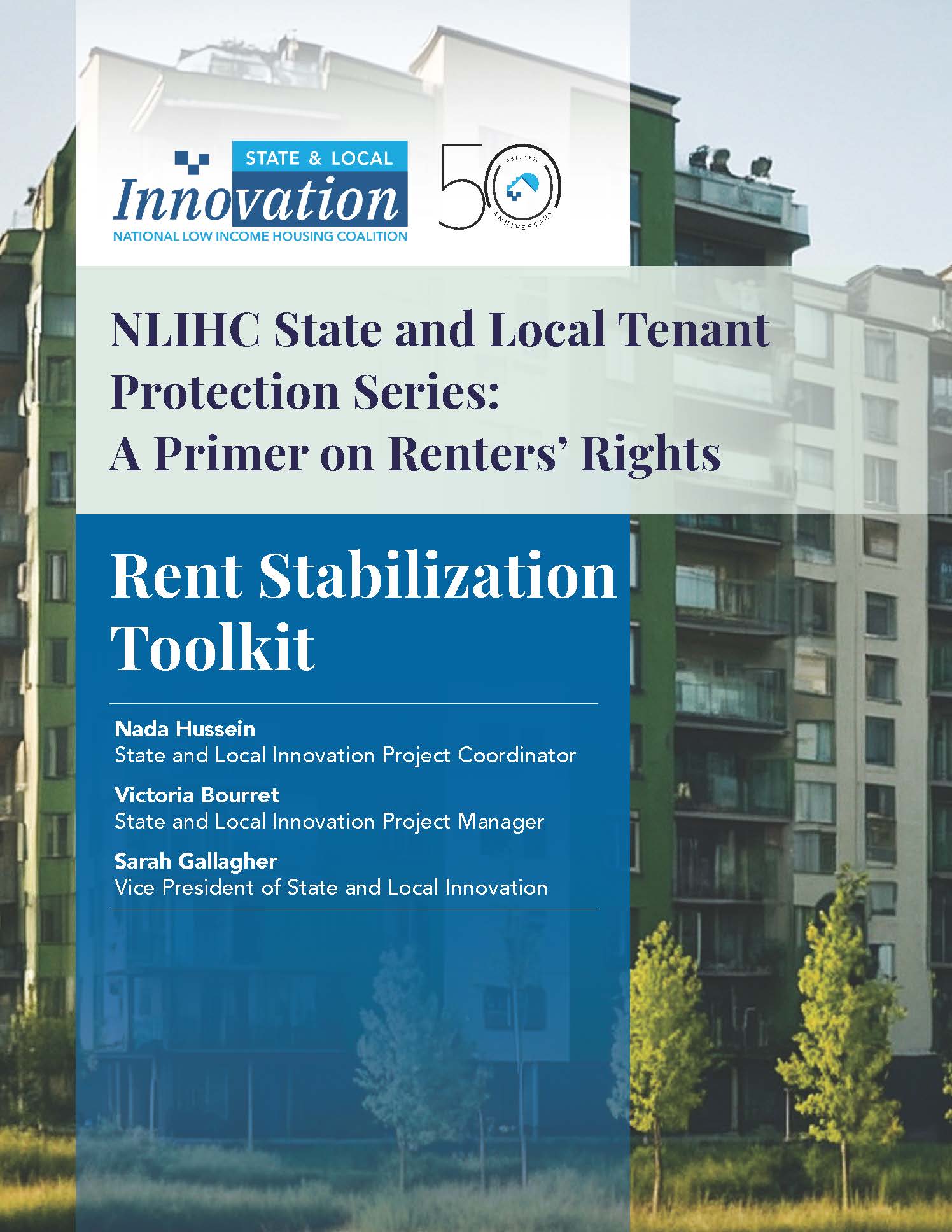
Rent stabilization policies limit the amount and/or frequency of rent increases to prevent excessive rent hikes that can price tenants out of their housing. Part of NLIHC’s State and Local Tenant Protection Series: A Primer on Renters’ Rights, this Rent Stabilization Toolkit, released in August 2024, provides an overview of rent stabilization, details common components of this type of protection, lists information about state and local jurisdictions that have adopted rent stabilization, and highlights complementary policies. 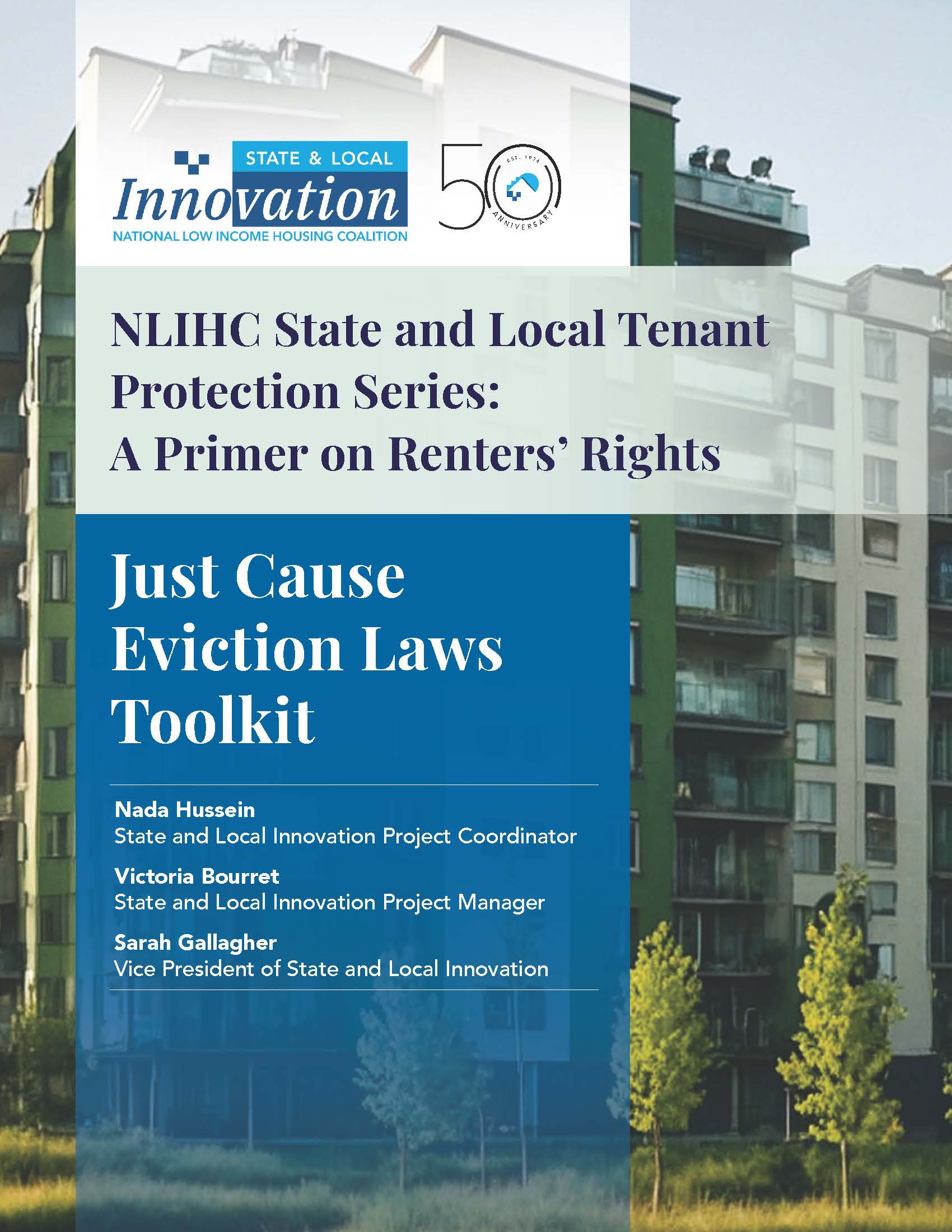
“Just cause” eviction standards – sometimes known as “good” or “for-cause” eviction standards – define the reasons for which landlords can evict tenants or refuse to renew a lease when the tenant is not at fault or found to be in violation of any law. Part of NLIHC’s State and Local Tenant Protection Series: A Primer on Renters’ Rights, this Just Cause Eviction Laws Toolkit, released in August 2024, provides an overview of just cause eviction measures, details common components of this type of protection, lists information about state and local jurisdictions that have adopted just cause laws, and highlights complementary policies. 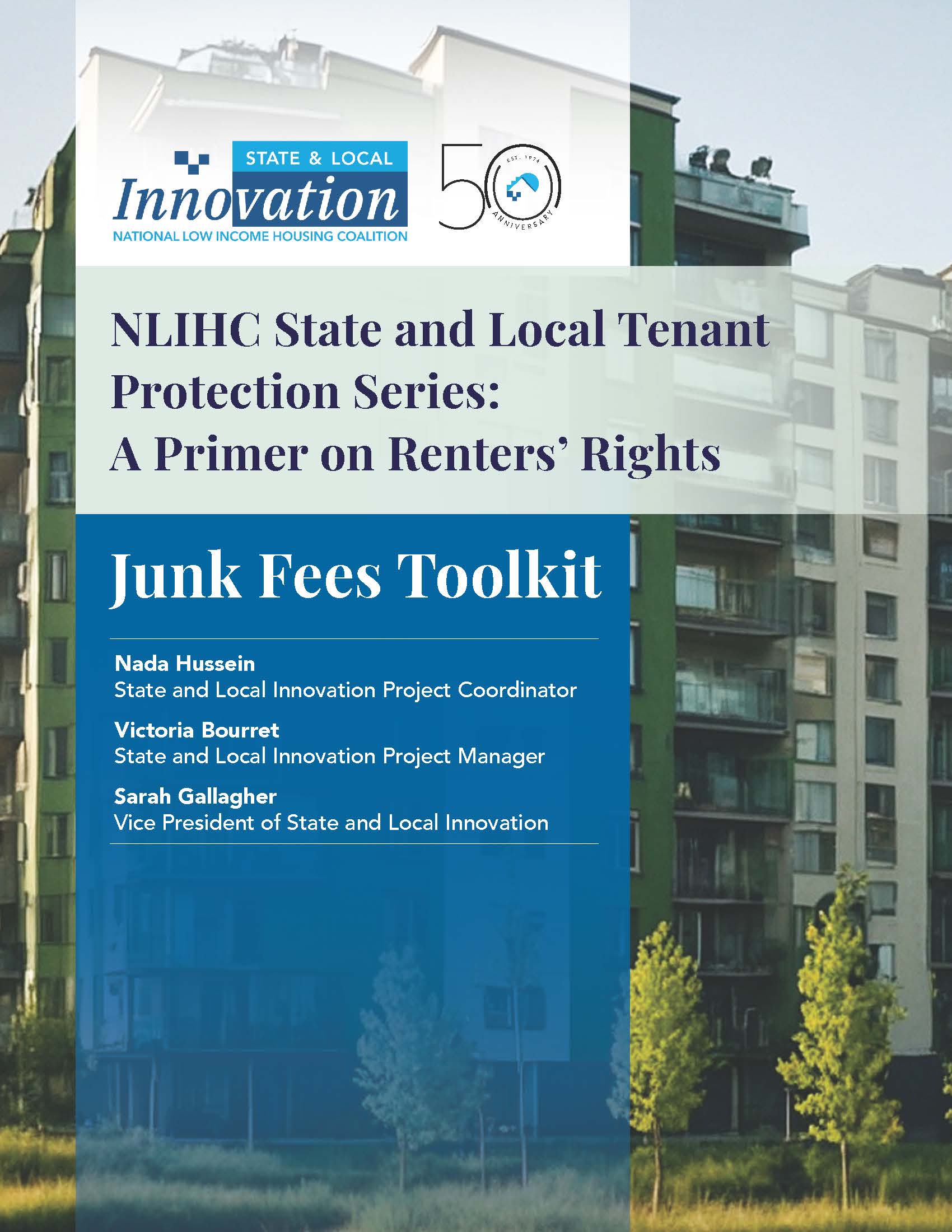
Rental fee limits regulate the types of fees or fee amounts that landlords or property owners can charge renters over the course of a lease term and seek to increase transparency in the rental market. Part of NLIHC’s State and Local Tenant Protection Series: A Primer on Renters’ Rights, this Rental Junk Fees Toolkit, released in August 2024, provides an overview of rental junk fee laws, details common components of this type of protection, lists information about state and local jurisdictions that have adopted rental junk fee laws, and highlights complementary policies. 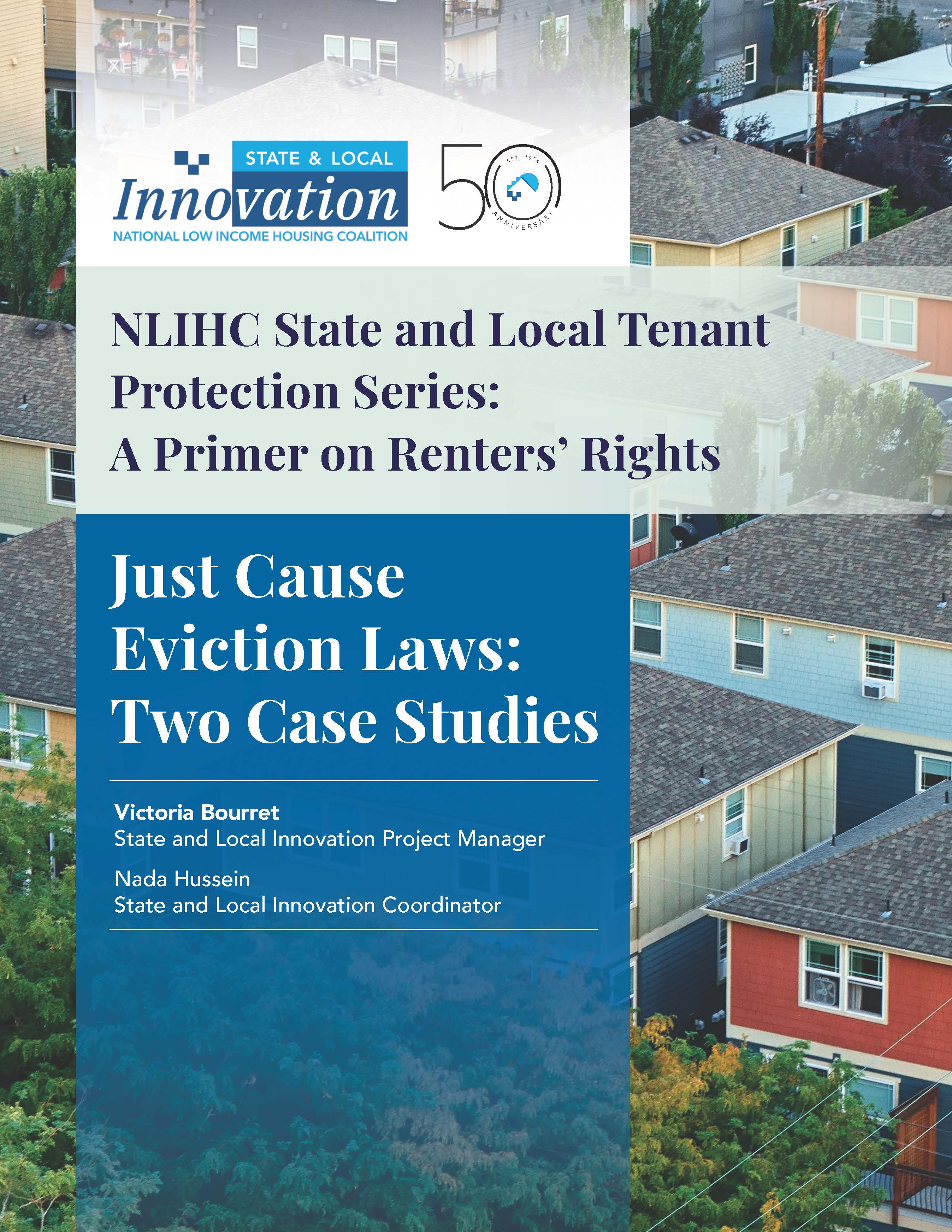
“Just cause” eviction standards define the reasons for which landlords can evict tenants or refuse to renew a lease when the tenant is not at fault or found to be in violation of any law. Just Cause Eviction Laws: Two Case Studies, released in July 2024, highlights two successful efforts to pass just cause protections – one in Oregon and the other in Washington State – and is part of NLIHC’s State and Local Tenant Protection Series: A Primer on Renters’ Rights, a collection of resources aiming to shape the conversation about state and local tenant protections. 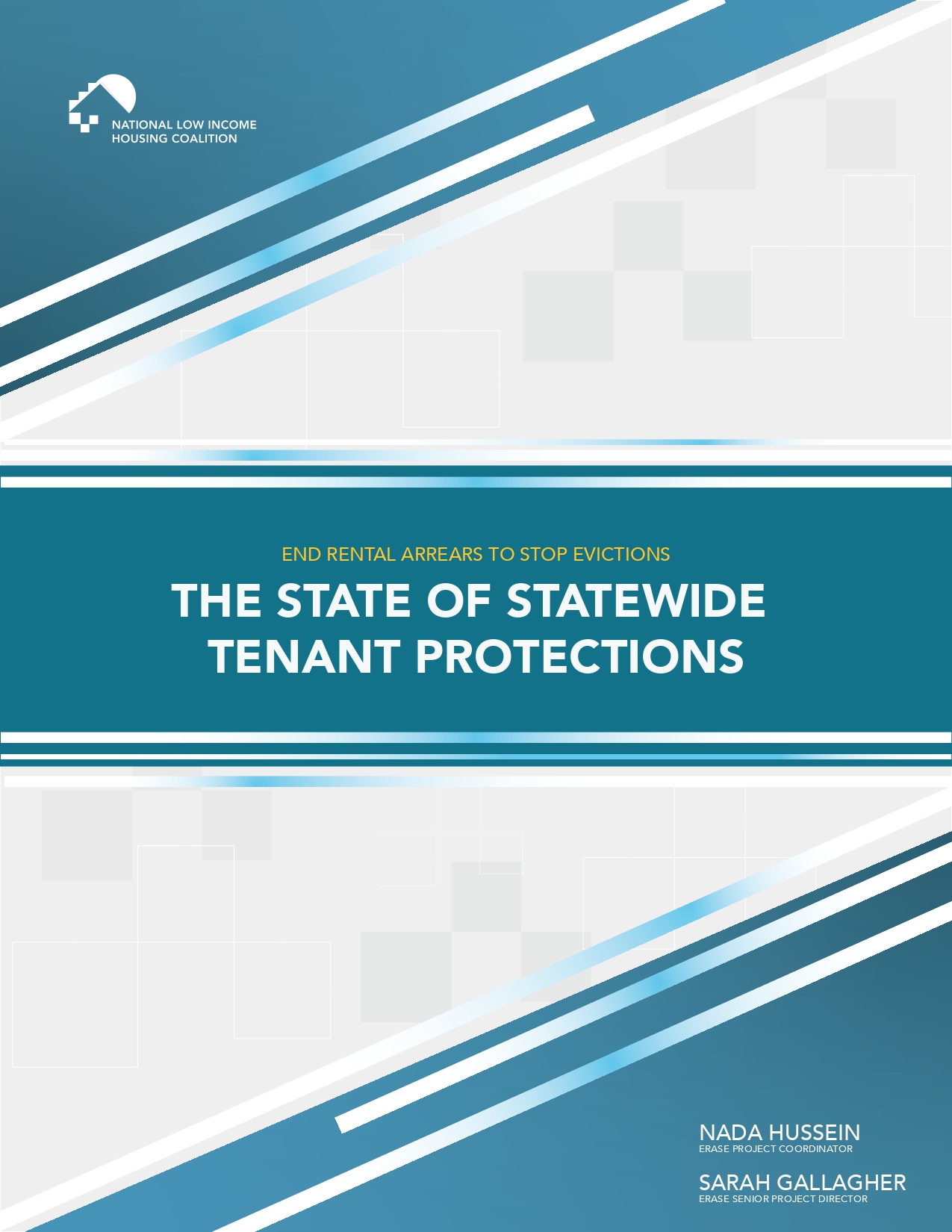
The State Of Statewide Tenant Protections, released in May 2023, provides information highlighting the efforts of state-level lawmakers to pass tenant protections that keep renters stably housed and prevent unjust discrimination and harassment both before and after the COVID-19 pandemic. The brief also provides in-depth summaries of common tenant protections, details the challenges faced by lawmakers enacting protections, and offers recommendations for developing and implementing laws aiming to protect renters over the long term. The brief includes more than 64 state-level protections passed since the start of the pandemic, including protections such as the civil right to counsel, measures prohibiting source-of-income discrimination, eviction record sealing and expungement legislation, rent stabilization and anti-rent gouging legislation, and “just cause” eviction laws. _page-0001.jpg)
This Eviction Record Sealing and Expungement Toolkit, released in April 2023, provides an overview of eviction record sealing and expungement protections nationwide, surveys record sealing and expungement legislation that is currently in place, identifies the core components of existing protections, and makes recommendations for lawmakers developing new eviction record sealing and expungement protections in their jurisdictions. The toolkit also brings together a wide range of information about the status and impact of evictions in the U.S. and existing eviction record sealing and expungement policies, as well as answers to frequently asked questions. 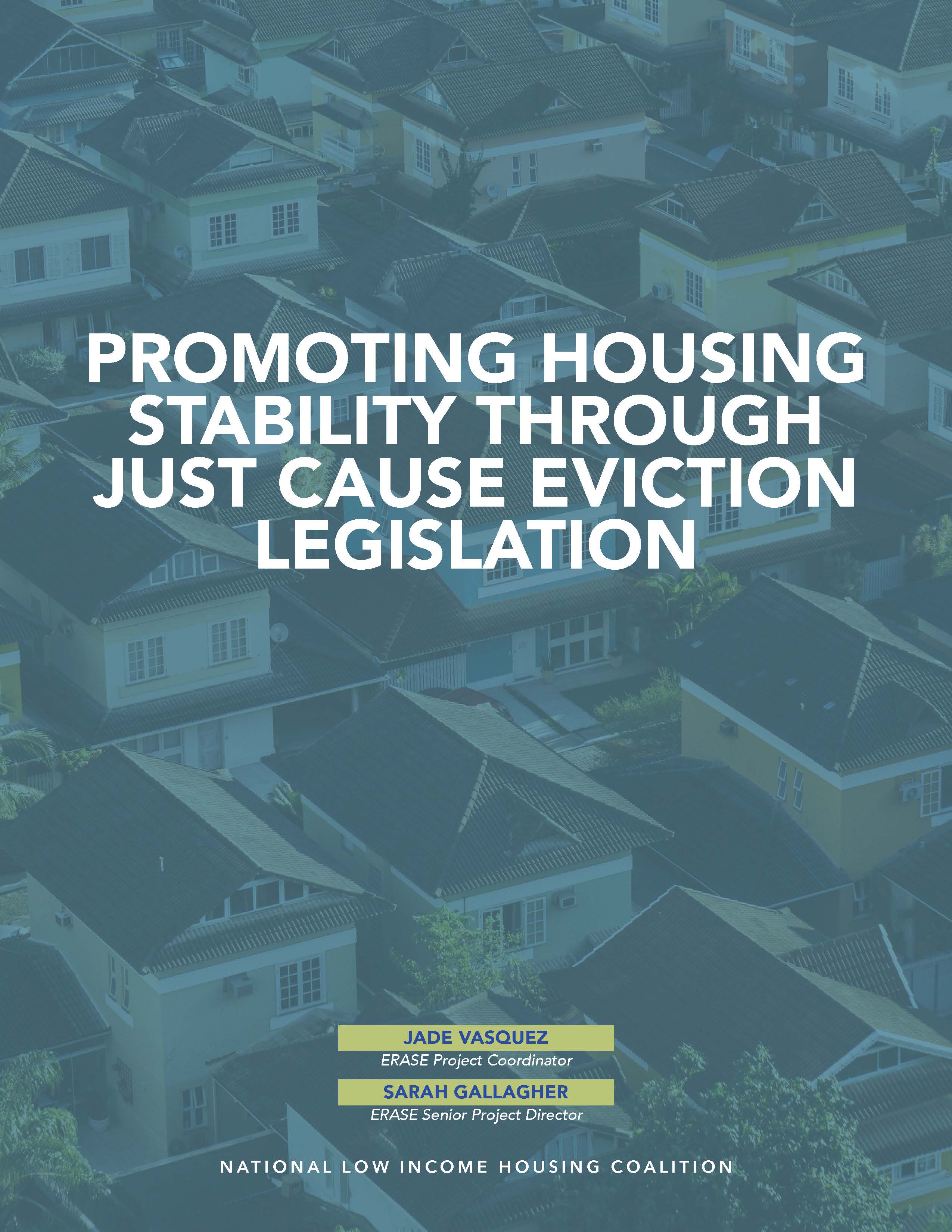
Promoting Housing Stability through Just Cause Eviction Legislation, released in May 2022, provides an overview of the goals of just cause legislation, shares examples of existing just cause protections, and offers recommendations about ways to advance just cause legislation at the local, state, and federal levels. Just cause – also known as “good cause” or “for cause” – eviction laws are legal protections that make the lease renewal process more predictable, empower tenants to advocate for better living conditions without fear of retaliation, provide limits on exorbitant rent increases to prevent renters from becoming extremely rent-burdened or experiencing displacement, and promote long-term housing stability for low-income and marginalized renters. Tenant Protections and Emergency Rental Assistance During and Beyond the COVID-19 Pandemic, released in January 2022, provides a descriptive analysis of new tenant protections and emergency rental assistance (ERA)-related policies enacted or implemented by states and local governments in 2021. The report includes more than 130 state and local tenant protections, including state and local eviction moratoriums, pauses on the eviction process to allow for ERA processing, mandates to increase access to information and limit tenant fees, increases to tenant representation during the eviction process, and protections that reduce discrimination, as well as recommendations to advance protections moving forward. -
Emergency Rental Assistance
Together with the national eviction moratorium, the federal Emergency Rental Assistance program (ERA) helped millions of renters avoid evictions and homelessness during the pandemic. In 2021, these resources helped cut eviction filings in half – to the lowest levels on record. People who received ERA were less likely to owe back rent and were less worried about their overall housing status. Receiving ERA was also associated with both increased access to healthcare and better overall health.
Now, however, as pandemic era protections and resources come to an end, eviction filing rates have reached or surpassed pre-pandemic averages in many communities: https://evictionlab.org/eviction-tracking
Given the success of ERA in promoting housing stability and preventing evictions, states and localities should make every effort to preserve the infrastructure created by ERA as an essential component of the housing safety net.
The Eviction Crisis Act
The “Eviction Crisis Act” (S.2182), introduced in the 117th Congress by Senators Rob Portman (R-OH), Michael Bennet (D-CO), and Sherrod Brown (D-OH), would provide $3.8 billion annually in emergency, short-term assistance to help stabilize households in crisis, building on lessons learned from and the infrastructure developed during the pandemic to keep families stably housed.
Urge Congress to Establish a Permanent Emergency Rental Assistance Fund today!
State and Local Emergency Rental Assistance Programs
NLIHC’s Rental Housing Programs Database tracks permanent state and local rental assistance programs, including emergency rental assistance programs.
ERASE Project
The End Rental Arrears to Stop Evictions (ERASE) project ran from January 2021 to December 2023, working with state and local partners to ensure that the historic $46.5 billion in emergency rental assistance (ERA) passed during the pandemic went to the lowest-income and most marginalized renters it was intended to help. Our collective efforts to ensure ERA programs were visible, accessible, and preventative kept millions of renters housed during the public health crisis.The ERASE project also supported efforts to pass, implement and enforce state and local tenant protections. NLIHC and our partners created toolkits and tracked the passage of more than 280 tenant protections since January 2021.
ERA Program Database and Resource Hub
The ERA Program Dashboard tracked 514 Treasury-supported ERA programs and shares information about programs’ key design and implementation features, in effect as of February 2022, that helped programs serve the lowest-income and most marginalized renters in need of housing assistance.
The ERA Resource Hub offers examples of how programs incorporated self-attestation, direct-to-tenant payments, prioritization, and other flexibilities to enhance equity and efficiency within their ERA programs
Resource Hub | National Low Income Housing Coalition (nlihc.org)
Resources
Briefs/Reports- End Rental Arrears to Stop Evictions (ERASE): History, Successes, and Highlight
- Emergency Rental Assistance: The Path to a Permanent Program Cohort Summary
- ERA In Action: Stories from 2021/2021 ERASE Cohort Members
- Emergency Rental Assistance: A Blueprint for A Permanent Program
- Extending the Reach of Emergency Rental Assistance: Leveraging Federal Resources
Research
Worksheets
-
End Homelessness

Homelessness is a Housing Problem
Homelessness is the result of structural inadequacies including the end of pandemic-era resources and protections that prevented homelessness; a lack of housing that is affordable to the lowest-income and most marginalized people; the growing gap between income growth and rising housing costs; and a lack of tenant protections and measures to prevent evictions.
Black, Indigenous, and people of color, and people with disabilities are disproportionately impacted by homelessness with Black and Indigenous people more likely to experience homelessness, and people with disabilities and indigenous people disproportionately represented among those who are unsheltered.
Source: HUD, 2023 Annual Homelessness Assessment Report (AHAR) to Congress. Available at https://bit.ly/2023AHAR. U.S. Census Bureau, QuickFacts: Population Estimates, July 1, 2023, (V2023).
We know how to end homelessness. Solutions, like Housing First, are rooted in efforts to ensure the health, wellness, and safety of those experiencing homelessness and focus on investing in proven solutions, such as permanent affordable housing, health care and supportive services, at the scale needed.
Housing First
Housing first is the best strategy for ending homelessness.
Housing first provides stable, affordable, and accessible housing to people experiencing homelessness quickly and without prerequisites, and voluntary supportive services are offered to assist with housing stability and well-being. Housing first is a flexible model that can be adapted to address the unique needs in local communities and tailored to the challenges facing individuals.
Learn more about Housing First.
Advancing Solutions to Unsheltered Homelessness
Harmful measures to criminalize homelessness or to “sweep” encampments without providing individuals with access to permanent housing, healthcare, and support services are counterproductive, dehumanizing, and fail to address the root causes of homelessness.
States and localities must combat growing efforts to criminalize homelessness and push short term punitive measures to address the visible symptoms of street homelessness without addressing the underlying causes.Grants Pass vs. Johnson
On June 28, 2024 the U.S. Supreme Court announced the verdict of Johnson V. Grants Pass: unhoused people can be arrested and fined for sleeping outside, even when there are no other safe or adequate housing or shelter options available.Homelessness is caused by a lack of affordable housing. The housing shortfall will not be solved by putting people in jail. The solution is funding housing at adequate levels, so every low-income person has access to safe, decent and affordable housing.
NLIHC, National Homelessness Law Center, National Coalition for the Homeless, National Alliance to End Homelessness, and the Center on Budget and Policy Priorities are working together to oppose the criminalization of homelessness and advocate for real solutions to the affordable housing and homelessness crisis.
Learn more about the grants pass decision here.
Resources
Amicus Brief- Brief of Amici Curiae in Support of Respondents - NLIHC, together with the Lawyers’ Committee for Civil Rights Under Law and the Center on Budget and Policy Priorities, submitted on April 3 an amicus brief to the U.S. Supreme Court supporting the rights of unhoused people in City of Grants Pass, Oregon v. Johnson.
Fact Sheets
- Successfully Fighting Against State and Local Homelessness Criminalization Bills – This fact sheet outlines the strategies advocacy organizations used to defeat legislation to criminalize homelessness.
-
Housing Trust Funds
Housing trust funds are established by elected government bodies—at the city, county, or state level—when a source or sources of public revenue are dedicated, by ordinance or law, to a distinct fund with the express and limited purpose of providing affordable housing.
-
Events
Join the National Tenant Protections Network calls on the fourth Thursday of every month. Sign up here.
The State and Local Tenant Protections Network (“The Network”) is a group of state and local housing-justice focused advocacy organizations centered on introducing, advancing, implementing, and enforcing tenant protections. Join the Network today!

